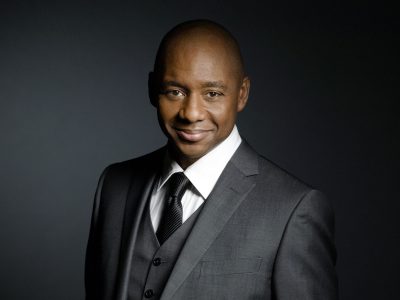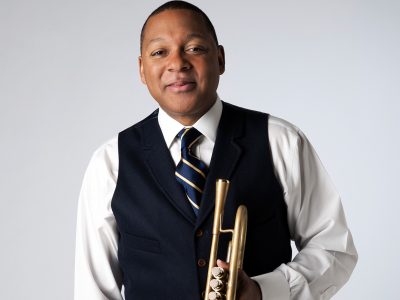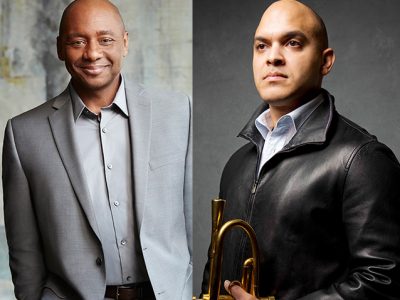- News
- A Marsalis Family Affair
A Marsalis Family Affair

In her introduction to the Chan Centre’s 2015/16 season, Co-Managing Director and Chan Centre Presents series curator Joyce Hinton writes, “[this] series features names that have reigned over the music world for decades.” Well, Marsalis is such a name.
It’s not just that four of family patriarch Ellis Marsalis’ six children are celebrated jazz musicians, but the extent to which their careers intersect and run parallel, that makes the Marsalis legacy truly “a family affair”. Branford, Wynton, Delfeayo, and Jason have collaborated on individual songs as well as larger projects, including the Ellis Marsalis and Sons ensemble—formed to mark Ellis’ retirement from The University of New Orleans—and Wynton’s original quintet, of which Branford was a member for three years.
Ellis Marsalis, born in 1934, first played the clarinet and the saxophone, but settled on the piano while he was still in high school. His career has been both as a musician and an educator. In the latter role he has had a direct influence on his children; sons Wynton, Branford and Delfeayo were all students of his during his tenure at The New Orleans Center for the Creative Arts. At the age of eighty-one, Ellis continues to play with his quintet on Friday evenings at the Snug Harbor Jazz Bistro in New Orleans.
Branford Marsalis, who will perform at the Chan Centre on February 13, is the oldest of the jazz-playing Marsalis siblings. His instrument of choice is the saxophone. In an article written for Popular Music and Society in 2000, Mary Ellison refers to Branford as the “…brilliant but less motivated eldest son…” of the Marsalis family. But when one considers Branford’s track record Ellison’s assertion doesn’t quite add up. Branford is a three-time GRAMMY Award winner and NEA Jazz Master, and has performed with the likes of Miles Davis, Herbie Hancock, Sting, and The Grateful Dead.
Branford is not content to limit his creative output to a single musical genre. In 1994 and ’97, he collaborated with DJ Premier to release two albums under the group name Buckshot LeFonque. Some have tried to locate the Buckshot LeFonque sound between jazz and hip hop, but for Branford, attempts to identify influences are reductive: “‘Musicians like me who listen to and play all kinds of music have to resist the urge to ghetto-ize music. Music is music, and my mission is to try my best to de-ghetto-ize it, to try to take the best from all genres and synthesize them into something different.'” In an interview conducted in 2012 with writer for the Jazz Times Bill Milkowski, Branford talks about his similarly open-minded approach to music production. When Milkowski comments on the quality of the drums on the quartet’s latest album, Four MFs Playin’ Tunes, Branford enthusiastically launches into a description of the approach taken to the album by sound engineer Rob Hunter, formerly of the metal band Raven:
…[Rob]understands drums. He quit the road and started working at a metal studio in upstate New York, and that’s where I met him…[W]hat was amazing to me was I could speak to him in musical terms; most engineers I couldn’t. And finally I said to him, ‘Man, have you ever done a jazz record?’ And he says no. So I sent him 20 jazz CDs and told him, ‘Listen to these and call me when you’re done.’ And we talked about the sound on them and I could tell he actually heard the sound on the records. And I said, ‘That’s my guy!’
That Branford is an artist who marches to his own beat is evident.
Wynton Marsalis is the second-oldest of the jazz-playing Marsalis siblings. Wynton began playing music at the age of eight. By seventeen he became the youngest musician ever to be admitted to Tanglewood’s Berkshire Music Center. Like Branford, Wynton is committed to keeping the genre of jazz in touch with its varied roots. He has won GRAMMY Awards for both jazz and classical music, and has composed and performed music for quartets, big bands, chamber music ensembles, symphony orchestras, and dance performances. In 1987, Wynton founded the now famous jazz program at Lincoln Center. In March of 2014 he performed at the Chan Centre with the Jazz at Lincoln Center Orchestra (JLCO) to a sold-out house. As of that performance, the JLCO had toured nearly four hundred cities in more than thirty-five countries on six continents.
Wynton, like his talented brothers, is a rising star seemingly too hot to touch. But he is generous with his time and enthusiasm. After his performance with the JLCO at the Chan Centre he attended a scheduled meet-and-greet with UBC School of Music students. An unofficial, pint-sized guest turned up with trumpet case in hand. Wynton and his management insisted the young boy be included in the meet-and-greet, and Wynton signed the aspiring trumpeter’s instrument case.
While Ellis, Branford and Wynton have mastered the piano, the saxophone and the trumpet respectively, Delfeayo rules the trombone. In her article for Popular Music and Society Ellison writes,
Delfeayo was not…pushed into being a musician. He was actually encouraged by his family to explore his considerable writing skills. It was not until he wanted to join the school band in the sixth grade that he decided to take up the trombone. He felt an affinity for the subtlety of the slide trombone and related to its connecting influence and to its relatively low profile as a lead instrument.
But, like his siblings, he refuses to limit the scope of his creative endeavors, and in addition to his career as a musician he is the founder of the Uptown Music Theatre (UMT) company. The UMT produces musical theatre shows with a focus on morality driven narratives and peaceful resolutions for both adult and children audiences.
Jason Marsalis is the youngest of the jazz-playing Marsalis siblings— younger than Delfeayo by a measure of twelve years. On the Marsalis Music website, he is described as “…the most precociously talented member of the entire family.” Following the stereotype of the rebellious younger sibling, Jason’s instrument of choice is the drums. His parents bought him his first kit (a toy) at the age of three.
A quick Google search proffers websites for Branford, Wynton, Delfeayo and Jason. But while each of his brothers maintains an online presence with an air of traditional sophistication, Jason’s home page features a cartoon image of himself dressed as a superhero and playing a sort of magical, floating xylophone. Who says jazz can’t accomodate a sense of humour?
The Marsalis siblings are leaders in the jazz community, as well as the African American community. The members of the Marsalis family have spoken frequently about the importance of jazz to the African American community, and the struggle to have the significant role that African Americans and African American culture played in the birth of the genre, and continues to play in its development, recognized. In the aforementioned interview with Jazz Times Branford says,
[I]f you believe that there are people making decisions about music based on cultural ignorance or arrogance, then there is an argument to be made for that. The whole idea of European jazz is that argument. You have people who say they want to play jazz and at the same time they want to pretend that Black American culture doesn’t even exist and has no part of the discussion.
Of course jazz is not the only arena in which Black Americans face discrimination. Shocking though it may seem, when Delfeayo was born in 1965, public schools were still segregated in New Orleans. In 1992 Delfeayo released his first album, titled Pontius Pilate’s Decision. According to Ellison:
[T]his was very much a concept album…[that] reflected sharply focused anger directed at individual proponents of the racism and corruption endemic in New Orleans…[T]he seeringly aggressive trombone and drum interchanges between Delfeayo and his younger brother Jason on “Barabbas”…evoke the duplicitous politicking of David Duke, the ex-Ku Klux Klan leader who had been elected to the Louisiana state legislature but resigned to stand as an unsuccessful gubernatorial candidate in 1991, while running the scurrilously neo fascist and racist National Association for the Advancement of White People.
The idea that music shouldn’t be ‘ghettoized’ via the application of genre labels (espoused above by Branford Marsalis), and the Marsalis family’s conspicuously open-minded and diverse approach to music-making, can be seen as models for better human relationships moving forward. The mission statement for the JLCO reads:
The mission of Jazz at Lincoln Center is to entertain, enrich and expand a global community for Jazz through performance, education and advocacy. We believe Jazz is a metaphor for Democracy. Because jazz is improvisational, it celebrates personal freedom and encourages individual expression. Because jazz is swinging, it dedicates that freedom to finding and maintaining common ground with others. Because jazz is rooted in the blues, it inspires us to face adversity with persistent optimism.
About the author:
Katherine Neil is a UBC student in the art history diploma program, as well as the Marketing and Communications Assistant at the Chan Centre.
———————————————————————————————————————-
Here are some links to Marsalis family performances:
Jason Marsalis:
The Jason Marsalis Vibes Quartet, “The 21st Century Trad Band”
Songs featuring multiple Marsalises:
Delfaeyo Marsalis, “The Weary Ways of Mary Magdalene”, Pontius Pilate’s Decision ft. Wynton Marsalis
The Marsalis Family performing “Cain and Abel”
The Marsalis Family performing “Struttin’ with Some Barbeque”
The Ellis Marsalis Quartet at the Sung Harbor Jazz Bistro in New Orleans



